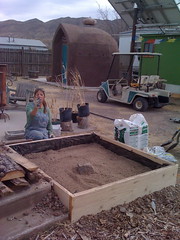
This week Im working on a series of podcasts as well as an article for United Academics Magazine which focuses on people who have created their own home and work spaces. Those who left cities and suburbs, left houses and apartments, left conventional jobs, and moved to a rural or undeveloped place. In their new environments they have built or rebuilt their homes using a mix of traditional, proven techniques and new, innovative features. They do things like grow/raise their own food, collect their own water, generate their own power, and create their own kinds of income-generating work.
This phenomenon, at first glance, is nothing new; people have been leaving cities for the country periodically for decades. (though statistically more people do the opposite) But this generation is the unique above all for the techniques and knowledge it brings to these remote locations. Knowledge that is not only their own, but the never-ending collective knowledge one can consult via the internet. Installing a solar power system? Never built a barn before? Canned your own preserves? Check youtube, the step-by-step instructions are there waiting for you.
Of course the internet is not the only source of knowledge, the offline community that one joins when moving to a rural area also has its own experience and skills which might be called upon. Between the depth of the internet and the generations of experience in your town, whatever it is you don’t yet know how to do on your own, you can learn. And this is exactly what is happening.
Back in the urban-suburban world that so many in the western hemisphere see as the only two choices, such life changes are probably still seen as odd or undesirable. They might lose sleep over barely tenable costs of living and work stress, but they’ve grown up with the idea that this is all normal and simply “life”. Need something for the kids or for the house? Go to Walmart. Need heat? Turn up the thermostat. All needs are met by some external service or source, all of which come at a monetary cost. Again, at some point this may seem like the only way life works. But this group of people has proven otherwise, and their will to take action in this manner has inspired more people to do the same.
In the coming series of podcasts you will hear from this special group of people. They’re explain how they used to live and what led them to make a radical change. They’ll also explain the details about why this way of life not only works better for them, but why they are better prepared for the foreseeable future where the value of money decays further and the ability to grow or make things becomes more rare and necessary.